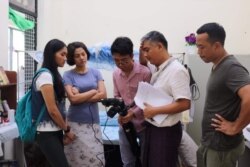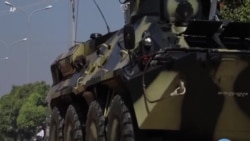When Burmese soldiers arrived at the offices of Kamayut Media on March 9, journalist Nathan Maung's only thought was of survival.
"They broke down our office door," Maung told VOA. "Finally, (they) came in and pointed (guns) at us. I said, 'Please don't shoot.' We just wanted to stay alive."
The raid came a month after Myanmar's military seized power in a coup in February.
Maung and his colleagues at the Yangon-based, privately owned news website had only a few minutes to secure their offices before he and company co-founder, Hanthar Nyein, were blindfolded and taken to prison. Maung spent 98 days there.
"No water for two days. No food for three days. No standing up, no walking around," Maung said of his weeklong interrogation, during which he was beaten and confined to a chair.
Soldiers accused Maung of being an enemy of the state and asked him questions about Kamayut Media's operations.
Guilt
Maung, who is of Burmese descent, said he resisted telling his interrogators that he was an American, fearing that he would be separated from his colleagues.
"They stopped torturing me once they found out I'm a U.S. citizen," he told VOA. But he said dozens of journalists who aren't Western citizens remain locked behind bars, facing worse conditions with less support.
Maung described harrowing accounts that Nyein recounted to him before the two were separated. Nearly three months later, he is not sure of Nyein's specific whereabouts.
"I feel so guilty … I left him with the other journalists in prison," said Maung, who was finally freed and deported to the U.S. on June 15.
Since the junta seized power in Myanmar in February, 97 journalists have been arrested, with 59 currently detained, according to the Assistance Association for Political Prisoners (Burma). The group says over 800 protesters have been killed.
The Myanmar junta's military council did not respond to VOA's request for comment.
"Journalists have their professional duty to provide the truth. But at the same time, they are fighting against the tyranny. Because without democracy, there's no freedom of press. There's no news," Maung told VOA.
Global arrests
The arrests of journalists at times of unrest are a global concern, as regimes seek to quell reporting and send a message to other reporters.
In some cases, the arrests draw international condemnation, like that of Belarusian blogger Raman Pratasevich, whose Ryanair flight was diverted to Minsk in May, where authorities immediately detained him; or Danny Fenster, an American editor arrested in Yangon, also in May.
Efforts to release journalists involve complicated and coordinated efforts from governments, families and international organizations.
Fenster's family spoke last week at the Michigan State House in Lansing as a resolution passed urging President Joe Biden and the U.S. State Department to act swiftly to secure Fenster's release.
Fenster's brother Bryan said a month pushing for the journalist's release has taken a toll.
"We're glad to do what we're doing — talking to media, getting out there, and trying to rally people — but it's very exhausting," he told VOA.
"So, we weren't incredibly excited off the bat to go to Lansing, but we're so happy we did it, because it really, really rejuvenated us," he said, adding that conversations with lawmakers there had been productive and supportive.
Danny Fenster, managing editor of Frontier Myanmar, was detained while trying to leave the country. He appeared briefly in court on June 17 where he faced charges of fomenting dissent against the military. He was finally allowed to speak to U.S. Embassy officials in Yangon on June 23.
The U.S. State Department has not responded to VOA's request for comment on Fenster's and Maung's cases, but earlier this month, a spokesperson said the U.S. was doing "everything we can to see to it that Danny Fenster is reunited with his family."
The journalist is due back in court on July 1.
Press freedom activists question how legitimate a trial will be, especially when governments fail to specify what exactly a journalist has been charged with.
"You need to constantly remind people of the fact that this journalist or these journalists are still detained on arbitrary grounds," said Emilie Lehmann-Jacobsen, Asia adviser at Copenhagen-based International Media Support.
While foreign governments and media support organizations operate on an international level to free detained journalists, Lehmann-Jacobsen told VOA that work is also being done to support journalists on the ground.
The arrests of Pratasevich in Belarus and the Myanmar military coup have led to multiple rounds of sanctions by the U.S., European Union and Britain.
In both countries, dozens of journalists have been detained and news outlets targeted. But Lehmann-Jacobsen said that generally, these moves are not enough to affect the fate of detained journalists.
"The military doesn't really care about what the international community says, obviously because there are other big international forces that have their back," she said, noting that Belarus has support from Russia, while the Association of Southeast Asian Nations (ASEAN) has generally been wary of condemning the actions of Myanmar's junta.
The support that jailed journalists may receive is complicated and multifaceted. While governments publicly condemn and enforce sanctions, Lehmann-Jacobsen said it can be assumed that many diplomatic conversations are happening "behind closed doors."
Additionally, organizations like IMS work locally, training media lawyers to understand the scope of their country's constitution to better argue a journalist's case in court.
Much of the work must be done preventatively — providing journalists the resources to protect themselves from arrest.
'Just be safe'
Maung described conversations with his reporters before his own arrest, when he urged them to be safe.
"My journalists were hiding in different parts of Burma, so I told them, 'Don't risk your life. Just be safe,'" he said, adding that some of the journalists left for Thailand where they reported remotely.
"But that's very difficult for photojournalists and video journalists," he said.
As international media organizations continue to support journalists, Maung, who is staying with friends in Virginia, said he will do all that he can, as well.
"I'm working to make sure they are healthy, they are strong," he said.
Maung said that through media lawyers, he has coordinated with the families of detained journalists to help send food to them in prison.
"That's all I can hope. And I can speak out about my friends to the international community," he said.









